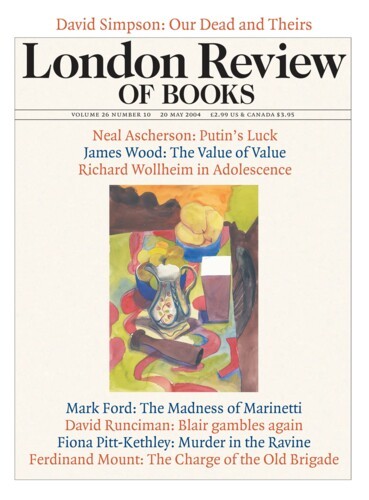Peregrine Worsthorne has revealed himself as a Scarlet Pimpernel de nos jours. In his new book, In Defence of Aristocracy (HarperCollins, £15), the former editor of the Sunday Telegraph sets out, if not to rescue that persecuted class (of which he is ‘in part’ a member) from extinction, then at least ‘to engender a change’ in ‘the present climate’ of anti-toff feeling. His argument, broadly, is that the aristocratic tradition in Britain has been predominantly one of public service, of the upper classes working tirelessly and selflessly for the common good. That tradition has been eroded, and the ‘meritocracy’ which is held to have taken its place isn’t adequate to the task. Certainly, the recent appointment of Alastair Campbell’s ‘mate’ John Scarlett as head of MI6, following his loyal performance during the Hutton Inquiry, doesn’t look like the most shining example of New Labour preserving the ‘merit’ in ‘meritocracy’.* The prime minister sternly reminded the press that Scarlett was selected by an independent panel, but who can say what subconscious influence might have been at work.
According to Worsthorne, the decadent, foppish aristocrats of popular imagination, the irresponsible hedonists to be found in Vile Bodies or Chips Channon’s interwar diaries, are an outrageous and wholly inaccurate caricature. Such unrepresentative types are merely the froth, ostentatious Percy Blakeneys masking the modest Pimpernels who ran the country so well for three centuries. Consider the ‘pathetic’ abdication of Edward VIII: ‘For surely, with the benefit of hindsight, we can now recognise that the truly remarkable aspect of the abdication was not the king’s irresponsible hedonism but the establishment’s revulsion – strong enough to force him off the throne – against his irresponsible hedonism.’ More truly remarkable, and nothing to do with hindsight, is that Worsthorne should think wanting to marry a divorcee an instance of irresponsible hedonism.
Worsthorne is evasive, or at least ambiguous, about the extent to which membership of the aristocracy is determined by blood (or genes, if you prefer). There’s some discussion of the relative benefits of the term ‘patrician’, which has fewer hereditary connotations, but ‘out of habit, I have decided to stick to aristocratic and aristocracy and to leave it to the reader to make the necessary adjustment according to the context.’ Perhaps it’s a test, like the princess and the pea: only real toffs will be able to tell which he means.
‘There are still those in the media,’ Worsthorne writes, ‘who bang on about the unfairness of the old class system, on how it saddles the working classes with a lifelong sense of inferiority and the upper classes with a lifelong sense of superiority.’ I’d always been under the impression that the unfairness had more to do with lifelong material inequalities, but never mind that. ‘This is yet another example of the media not living in the real world. In the real world the boot is on the other foot. The aristocracy has long since ceased to look down their noses. Far from lording it, it now is almost embarrassingly eager to eat humble pie.’ Heavens, it doesn’t even know whether it’s singular or plural.
The 11th Duke of Devonshire, who died earlier this month, was once asked by an estate worker when he was planning to retire. ‘I’ve never worked a day in my life,’ he replied, ‘so how can I retire?’ Worsthorne, however, ‘being a younger son’, had ‘to think of earning my own living’:
To work on the Times had been a vague ambition of mine ever since my Aunt Nell, with whom I used to stay while down from Cambridge early in the war, used me as a messenger to take up to London on Sunday night the letters, written over the weekend, with which she regularly bombarded her friends and relations in high places, one of whom happened then to be the editor of the Times, Geoffrey Dawson, who, finding a likely lad with the right connections in the anteroom to his office, had, in the way things used to happen in those days, taken me out to supper at Pratts. The rest, as they say, is history.
These days, Aunt Nell’s nephews have been supplanted – or rather joined, since the outlook for the old upper classes isn’t as desperate as Worsthorne would have us believe – by Alastair Campbell’s mates. Either way, it’s still a case of jobs for the boys.
There was almost a closer family connection to the newspaper: Worsthorne’s grandfather had ‘tried – only being just nipped in the bud by the Astor family – to buy the Times from Lord Northcliffe’. It’s a shame that he doesn’t know the difference between nipping something in the bud, and pipping someone at the post.
Send Letters To:
The Editor
London Review of Books,
28 Little Russell Street
London, WC1A 2HN
letters@lrb.co.uk
Please include name, address, and a telephone number.

